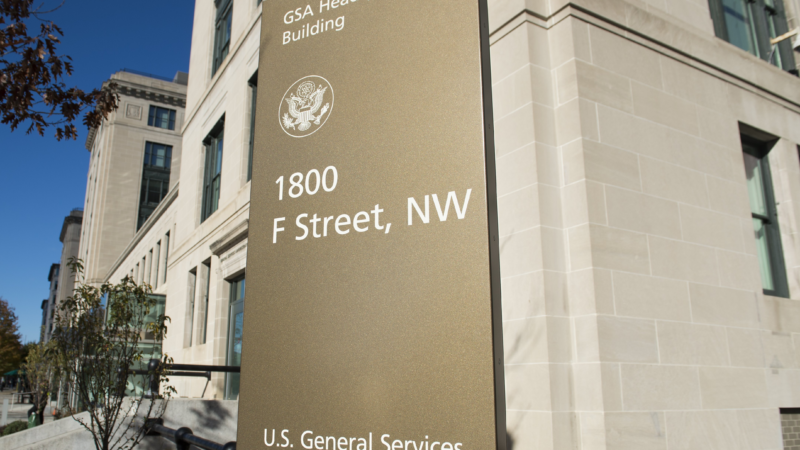GSA staff facing massive cuts and fears of ‘nonstop’ surveillance
The General Services Administration, which manages federal real estate and contracts, plans to slash its budget in half and ramp up monitoring of remaining staff—a model that might soon be deployed across most of the rest of the federal government.
The specifics of the plans inside GSA, including to halve the costs of programs, contracts, and salaries, were described to NPR by two GSA officials who were told about the plans by agency leadership. The officials were not authorized to speak to the press and spoke to NPR on condition of anonymity, fearing reprisal from the Trump administration.
Staffers have been told to expect deep job cuts among the agency’s approximately 12,000 employees and the closure of many of its offices around the country, the sources said. Those employees who remain are being warned to expect their actions to be surveilled, from their swipes into government facilities to the keystrokes they type on their computers.
The move is directed by a political Trump appointee, Josh Gruenbaum, who oversees GSA’s Federal Acquisition Service. GSA’s budget was $61 billion in the 2024 fiscal year.
The staffing decisions were communicated to some GSA staff during emergency meetings late last week. Staffers are refraining from communicating over email or internal messaging systems for fear of monitoring and retaliation, the GSA officials told NPR.
The cuts at GSA might be a model for how the Trump administration will approach making cuts at other agencies. One of the GSA officials said they were told that the White House would be pursuing similar 50% staff cuts across large parts of the federal government, with limited exceptions.
The GSA did not immediately respond to a request for comment from NPR.
The cuts are part of a broader effort by the Trump administration and the Department of Government Efficiency, or DOGE, team led by Tesla and SpaceX CEO Elon Musk to drastically shrink the size of the federal government. DOGE is not a true government department but, rather, a group of staff members tasked with ensuring that President Trump’s priorities are enacted across the government.
The government’s “circulatory system”
While not a well-known agency, GSA is vital to the government’s ability to function. The agency oversees some 360 million square feet of real estate and $105 billion in annual contracts, according to the agency’s 2024 annual report. It also develops technology for use across federal agencies.
GSA is divided into two divisions: one that acquires real estate and the other that runs almost all of the government’s contracts. The procurement division runs like a business, like an “international conglomerate on steroids,” one of the sources explained.
One of the GSA officials described the agency’s work as the “circulatory system” of the federal government.
According to the officials who spoke with NPR, the staffers who will be retained must meet three major criteria: that their job is required by law, that their work is “critical” to the mission, and that their work generates revenue. The national security implications of cancelled contracts, cybersecurity concerns over federal technology systems, and other factors were not mentioned as considerations for keeping staff, the sources said.
High-level GSA officials were told they were being provided the opportunity to help select which employee roles would be eliminated, and were asked to provide lists of employees who might not fit the criteria outlined by the administration.
Some of the job roles being targeted included communications, administrative support, stakeholder engagement, and interns. GSA employees were told IT roles would be “consolidated,” said one of the GSA officials. “They’re doing everything so fast, it’s on purpose so you can’t fight,” the official continued. In the past, most federal civil servants couldn’t be fired at will without cause or notice, though the Trump administration is challenging that precedent while unions and employees are pursuing legal challenges.

In addition, all regional and field offices are set to be eliminated and consolidated into four to five “hubs” for all GSA employees. It is unclear what would happen to employees who live outside the geographic regions where the new hubs would be located. It’s also unclear how expensive it would be to provide office space large enough for the remaining consolidated workforce in these regional hubs. “They keep saying they want to cut costs, but they keep doing things that are costly,” said one of the sources.
All GSA staff are expected to end remote work entirely and be back in the office by March 3rd.
“Nonstop monitoring”
For employees who remain in their jobs after the cuts and who do not take the Trump administration’s deferred resignation offer to most federal workers — which is being legally challenged — conditions might be difficult.
Staff were told by their managers that their work will be closely monitored going forward, the GSA officials said.
“There are going to be no more carrots, only sticks,” said one of the GSA officials.
Some employees were told that would include monitoring of when employees logged in and out of their devices, when employees swipe in and out of their workspaces and monitoring of all their work chats. They were also told that “keylogger” software that would keep track of everything the employees type on their work machines would be installed on their work computers, the GSA officials said.
Government-issued devices are subject to monitoring, but the people NPR spoke with said this level of surveillance would be a dramatic change from how GSA has operated in past administrations, both Republican and Democratic. The introduction of keylogging is particularly alarming to GSA staff working on sensitive technical projects, who worry it could compromise security.
“If you stay, they’re going to restructure everything,” said one of the GSA sources. It’s like a “Soviet-style reporting system, Orwellian nonstop monitoring,” they continued. “This is bananas.”
DOGE staffers are embedded within GSA’s Technology Transformation Services (TTS), a unit that develops tech tools and platforms for the government, according to one of the GSA officials familiar with the agency’s broader plans and two GSA employees who spoke to NPR on condition of anonymity. Former Tesla software engineer Thomas Shedd is leading TTS.
Staffers working for DOGE at other agencies have gained access to key systems with classified material or private information on federal employees or anyone who has done business with the government. At GSA, protocols prevent new staff at TTS — including members of the DOGE team — from accessing sensitive information or making changes without oversight, one of the GSA employees said. Technical teams monitor for any attempts to install new software or write new code, and have yet to see evidence of that activity, the employee said.
On Monday, employees were told they could no longer use their badges to access GSA’s Washington, D.C. headquarters as they did previously, but would instead be forced to go through “full security screenings” including an X-ray scans prior to entering the building, as visitors are required to do, according to a screenshot of an internal email shared with NPR.
The mood across GSA is grim. “People are crying, these people have children,” said one of the GSA officials. “Everyone has bills, everyone has to put food on the table. We still have to survive.”
“This is a paradigm shift,” the official continued. “The world of government as you knew it, it’s gone.”
Have information you want to share about the ongoing changes at GSA or across the federal government? Reach out to these authors. Jenna McLaughlin is available through encrypted communications on Signal at JennaMcLaughlin.54 and Shannon Bond is on Signal at shannonbond.01.
NPR’s Kate Concannon contributed reporting to this story.
Indiana completes undefeated season and wins first national title, beating Miami
Indiana bullied its way into the history books Monday night, toppling Miami 27-21 to put the finishing touch on a rags-to-riches story, an undefeated season and the national title.
Top U.S. archbishops denounce American foreign policy
The three most-senior cardinals leading U.S. archdioceses issued the rebuke in a joint statement on Monday, saying recent policies have thrown America's "morale role in confronting evil" into question.
Italian fashion designer Valentino dies at 93
Garavani built one of the most recognizable luxury brands in the world. His clients included royalty, Hollywood stars, and first ladies.
Sheinbaum reassures Mexico after US military movements spark concern
Mexican President Claudia Sheinbaum quelled concerns on Monday about two recent movements of the U.S. military in the vicinity of Mexico that have the country on edge since the attack on Venezuela.
Trump says he’s pursuing Greenland after perceived Nobel Peace Prize snub
"Considering your Country decided not to give me the Nobel Peace Prize… I no longer feel an obligation to think purely of Peace," Trump wrote in a message to the Norwegian Prime Minister.
Can exercise and anti-inflammatories fend off aging? A study aims to find out
New research is underway to test whether a combination of high-intensity interval training and generic medicines can slow down aging and fend off age-related diseases. Here's how it might work.








